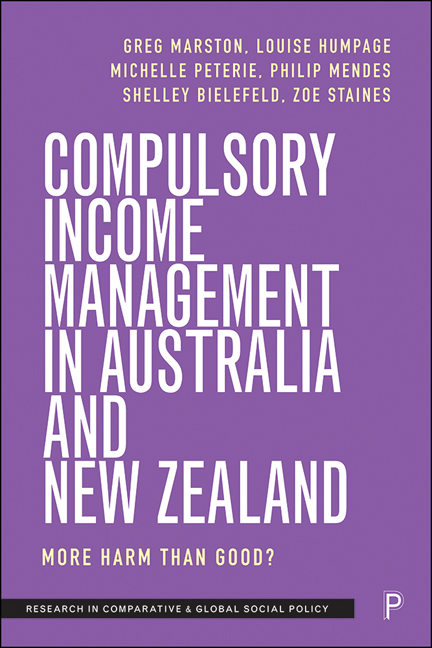Book contents
- Frontmatter
- Contents
- List of abbreviations
- About the authors
- Acknowledgements
- Series preface
- 1 Framing welfare conditionality
- 2 Why Income Management?
- 3 Barriers to implementing Compulsory Income Management
- 4 Identity and emotion
- 5 Procedural, consumer and contractual rights, and access to justice
- 6 Resistance and reform: individual and collective agency
- 7 Voluntary Income Management and financial education
- 8 Recalibrating social security and reimagining work
- References
- Index
6 - Resistance and reform: individual and collective agency
Published online by Cambridge University Press: 08 October 2022
- Frontmatter
- Contents
- List of abbreviations
- About the authors
- Acknowledgements
- Series preface
- 1 Framing welfare conditionality
- 2 Why Income Management?
- 3 Barriers to implementing Compulsory Income Management
- 4 Identity and emotion
- 5 Procedural, consumer and contractual rights, and access to justice
- 6 Resistance and reform: individual and collective agency
- 7 Voluntary Income Management and financial education
- 8 Recalibrating social security and reimagining work
- References
- Index
Summary
‘I have an anxiety problem, that was hard for me to do. But it meant something, so we all just did it, even though it was all hard for us all. Yelled our lungs out. I was blowing a trumpet and everything.’ (Sue, Ceduna)
Introduction
So far, this book has shed light on the experiences of people impacted by CIM. It has shown that CIM disempowers welfare recipients, denying them control over their finances, corroding their rights, and ultimately damaging both their wellbeing and their capacity to participate in community life. Against this backdrop, this chapter considers cardholder resistance – understood in this context to mean refusal to accept the material conditions of ‘being on the card’ and/ or the devalued social status attached to being arbitrarily categorised as ‘irresponsible’.
Understanding dissent in social policy research is necessary for at least two reasons. First, on a theoretical level, it is important because power and resistance have been influentially conceptualised – most notably by Foucault (1978) – as mutually constitutive. From this viewpoint, any study of power that does not also consider resistance risks oversimplification and, indeed, misrepresentation. Second, on an ethico-political level, accounting for dissent ensures that the agency of those in question is recognised. To represent welfare recipients as the two-dimensional victims of a malevolent state would be to ignore their complexity and capabilities, and thus inadvertently contribute to their denigration in public discourse.
This chapter has six parts. First, it provides a brief overview of resistance as a sociological concept and, in doing so, constructs a theoretical scaffolding for the chapter. Second, it explores how the sociopolitical context of CIM in Australia and New Zealand thwarts overt forms of resistance and pushes cardholders towards more covert means of dissent. In parts three and four, it describes these ‘everyday’ forms of resistance, focusing, respectively, on cardholder efforts to circumvent restrictions, and cardholder attempts to contest the policy's framing. Part five then turns to open public protest in Australia, exploring the interplay between everyday and public resistance, and why a similar movement has not emerged in New Zealand. The chapter concludes by situating these examples of resistance within our growing understanding of CIM as an instrument of power.
- Type
- Chapter
- Information
- Compulsory Income Management in Australia and New ZealandMore Harm than Good?, pp. 125 - 146Publisher: Bristol University PressPrint publication year: 2022



